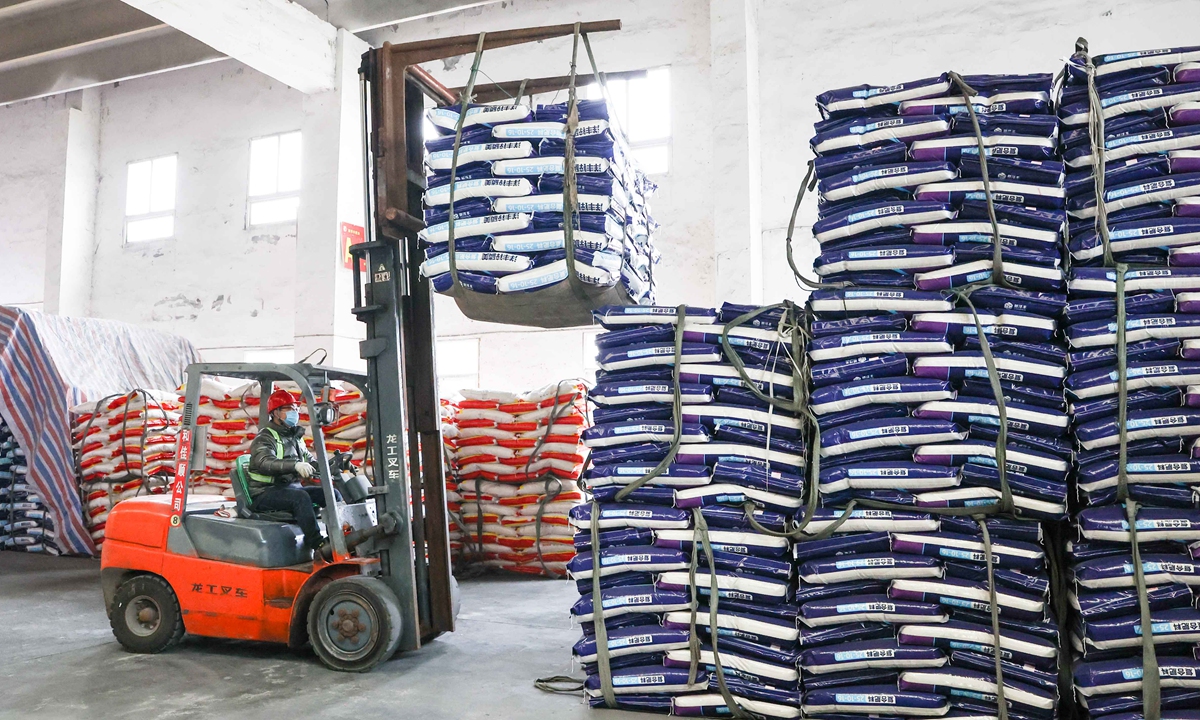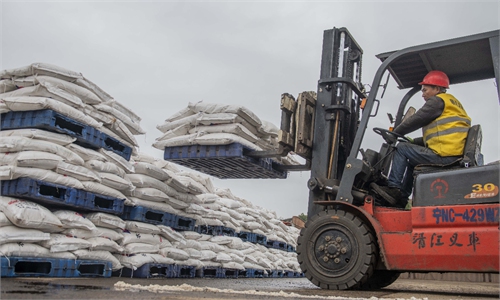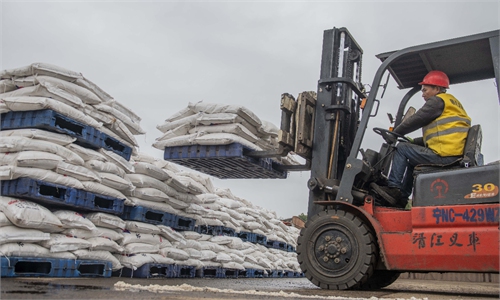Russia-Ukraine conflict affects fertilizer market, but overall impact on China 'limited'
Supply chain rift amid Russia-Ukraine conflict isn't major constraint for China: analysts

Workers load fertilizer at an industrial park in Ruichang, East China's Jiangxi Province on February 15, 2022. As the spring ploughing season approaches, workers have been speeding up fertilizer production to meet rising demand. Photo: cnsphotos
The Russia-Ukraine conflict has resulted in a rift in global fertilizer supply chains, with both countries moving to suspend their fertilizer exports, inevitably putting upward pressure on China's potash fertilizer market that remains reliant on imported potash, industry analysts said on Sunday.
However, the fallout of the conflict-induced supply chain turbulence on the domestic fertilizer market as a whole is limited, experts said on Sunday, citing domestic policy changes and the rising costs of fertilizer manufacturing, among other major factors behind an uptrend in fertilizer prices. The impact on China's farm produce market will also be largely subdued, they said.
Potash is a significant fertilizer used on major commodity crops.
Ukraine has banned exports of fertilizers, its agriculture ministry said on Saturday, according to Reuters.
"The cabinet of ministers is introducing a zero quota for the export of mineral fertilizers that is a de facto ban on the export of fertilizers from Ukraine," the Reuters report said, citing a statement from the ministry.
The ban came on the heels of a similar move by Russia, only second to Canada in the global ranking of potash production.
Russia has decided to "temporarily suspend fertilizer exports," the Russian industry minister announced on Thursday, according to Seeking Alpha.
The announcement came a week after the Russian trade ministry recommended that "Russian producers temporarily suspend export shipments of Russian fertilizers until carriers resume regular work and provide guarantees that Russian fertilizer exports will be completed in full."
The export suspensions are piling up pressure on domestic fertilizer prices, which were already hovering at high levels, Li Guoxiang, a research fellow at the Chinese Academy of Social Sciences, told the Global Times on Sunday.
An index gauging the wholesale price of potassium chloride soared 90.54 percent year-on-year on March 7, according to the China Business Network (CBN), citing data from the China Agricultural Means of Production Association.
Nitrogen (mostly in the form of urea), phosphorus and potash are the three primary nutrients in commercial fertilizers. China is entirely self-sufficient in urea and phosphorus, and it can even ship a certain amount of domestically produced urea and phosphorus fertilizers to overseas markets. As for potash, the country has to import this from Canada, Russia and Belarus, the CBN report said.
Last year, China's imports of potassium chloride from Russia totaled around 2.25 million tons, accounting for about 30 percent of the country's total imports, the Securities Times reported.
Put in perspective: the import reliance of China's potash market stood at 49.5 percent in 2019, industry data showed.
Domestic potash prices might bear the brunt of supply chain shortages, as the export bans could lead to a global rise in potash prices, analysts said. But they also downplayed the impact on China's domestic grain market.
The use of potash on grain crops is much lower than on fruit and vegetables, Ma Wenfeng, a senior analyst at the Beijing Orient Agribusiness Consultancy, told the Global Times on Sunday.
An overall rise in domestic fertilizer prices has been partly attributed to supply-side reforms that have resulted in an industry reshuffle, with some smaller fertilizer manufacturers ceasing operations, according to Ma.
China has pushed for the development of green fertilizer supply chains over the past few years, downsizing the domestic fertilizer market, Li said.
Supply shortages began to emerge last year, compounded by an increase in grain output, he continued, noting that a recent surge in commodity prices also pushed up manufacturing costs.
As part of efforts to ensure grain production in the face of rising fertilizer costs, the government has continued to offer subsidies to farmers, the experts pointed out.
"To ensure reasonable returns for grain growers and incentivize major grain-producing areas, we will ensure the provision of agricultural supplies such as chemical fertilizers at stable prices, continue to provide agricultural supply subsidies to grain growers, and step up support for major grain-producing areas," read the government work report delivered on March 5 at the opening of the annual legislative session.


